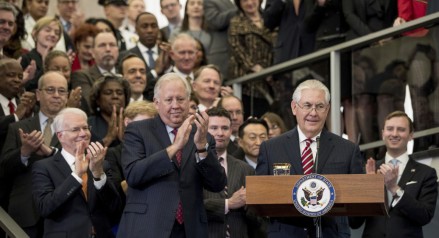Ok, first things first. This blog has a disclaimer page, but many of you may not have read it previously. Given what I’m about to talk about however, I’m going to repeat it here: This blog is intended to give a personal insight into our life in the U.S. Foreign Service. It is not associated in any way with the U.S. Department of State. The views expressed here are my own and do not necessarily reflect those of U.S. government, any of its agencies/departments, or employees (including B). Just keep this in mind as you read on.
A few months ago a new Secretary of State was sworn in to lead the Department of State and the Foreign Service. Notwithstanding my misgivings related to his exclusively corporate background and my worry that, having earned well over $130 million in the five years prior to being tapped to join the State Department, he would have literally no understanding of the public servants who populate the department (the highest paid of whom make in the neighborhood of 0.006 % of his salary during the same period), after listening to his welcome remarks I had relatively high hopes.

Among other things, I liked that he promised to deploy talent and resources in “the most efficient ways possible” and to “gather information on what processes should be reformed,” and not to “change for the sake of change.”
I was comforted when he said he would “depend on the expertise of this institution… [and the] accumulated knowledge and experience that cannot be replicated anywhere else.” Finally, I was glad that he mentioned wanting to keep “all of our people safe” and he used the vernacular we all use internally referring to “our State Department family.”
There were early indicators that this lovely speech was, in fact, virtually the exact opposite of what he planned to do – longtime career diplomats (ie: people who are non-political appointees and serve whatever president is in office regardless of their party affiliation) were fired instead of consulted, he refused to talk to the press, he refused to meet with embassy employees when he visited other countries – failing to gather or depend on even the most rudimentary “accumulated knowledge and experience” of the Foreign Service corps. It seemed very much like he was instituting change entirely – and without any basis – for the sake of change.
Then came, for me, the comment that I cannot get past. He apparently told one of his deputies that he believed employing EFMs (eligible family members – ie: me) was “corporate welfare” and that it was going to stop.

So that’s what my decision (with B) to give up our cushy private sector life to serve our country overseas in a third world country – and more importantly what the hard work I’ve done working for the U.S. Embassy in Kinshasa for the last year – means to our new ultimate boss. According to him I’m nothing more than a welfare queen mooching off the federal government’s good graces.
The irony of this comment coming from a man who used to be the CEO of ExxonMobil, which by most estimates receives yearly federal tax breaks and subsidies of more than $600 million while reaping billions of dollars in profit and paying him more than a third of this amount in salary and stock options, is almost laughable. The very definition of “corporate welfare” is a government’s bestowal of money grants, tax breaks and other favorable treatments on corporations. Let’s just say that, in my opinion, it displays a shocking ignorance of what corporate welfare is and represents.
Setting that aside, the State Department isn’t a corporation. It is a government agency and it is not the job of government agencies to make a profit that can be disbursed to its shareholders – which is the only job of corporations – it is the job of government agencies to provide a service. This fundamental difference between a corporation and a government seems to be lost on more members of the current administration than just “S,” but it is a vitally important distinction.
If the government is to be run “for profit,” then we can kiss police, fire, military, libraries, postal services and public education goodbye – the government doesn’t make money in any of those arenas because that is NOT what it is there to do. We pool our money through taxes and that pooled money pays for things that, individually, we could not afford. Could you build a road from home to work with your own money? No. But if you pool your money and have the government do it with that pooled money – you – and all the other people you pooled your money with – benefit from that service.
Likewise, the Foreign Service is just what it says it is – a service. We live in Congo to provide a service to our country. When U.S. Citizens are here and need help – our consular officers (and plenty of other members of the embassy) help them. Those same officers also vet people who want to come to the U.S. to visit, live and work – the first line of defense of our borders. When a U.S. business is interested in trying to expand its market in a foreign country it is commercial officers who help them navigate foreign commerce. And what is the result of a U.S. company selling more products overseas? More jobs at home.
We promote stability in unstable places, we take American ideals and the beauty of democracy with us to every corner of the world and by doing that we allow people who might otherwise see Americans as violent and xenophobic to understand that we are actually interested in peace and the growth of all nations because most of us understand how interconnected the world is these days and how we benefit when we work with – and not against – other nations.

So let me tell you about the EFMs I work with and you can determine for yourselves which ones can be described as accepting “welfare”: One has a masters in economics, one has a PhD in international politics, one has an MBA, another has a masters in education, more than one has a JD – and these are just the highest levels of education we have each received. We all have years of experience – both in government and in the private sector – doing a variety of jobs that the U.S. Government now gets to leverage to contribute to their missions abroad.
I have no doubt that each one of us is fully qualified to be a Foreign Service Officer, but for various reasons we’ve made the decision to “just” be EFMs. In my case it is because (a) I’ve had a full career and I’m happy to become a jack of all trades as we go from post to post; and (b) we’ve seen how hard it is to be a “tandem” couple and we’re not interested – in our “second” careers with a small child – in going through that.
EFM employees are ubiquitous – in Africa there are 1000 career FSOs and 600 EFMs employed in our missions – so more than a third of the employees at U.S. Embassies in Africa are EFMs. Eliminate those 600 “corporate welfare” jobs and the result isn’t efficiency – it’s chaos.
I’ve spent the last year working at U.S. Embassy – Kinshasa. I’ve worked my tail off keeping Washington informed about Yellow Fever, Cholera and TB outbreaks – a few diseases it might behoove us to keep track of so they don’t end up in CONUS as the next epidemic. I have helped countless U.S. businesses who are already in DRC and needed help from the Embassy, or who were looking to get into the Congolese market and turned to the Embassy for guidance and information. In short, I’ve done all the same things an FSO would be doing in my position.
For my troubles the U.S. Government has paid me – per hour – less than my clients used to pay for 3 minutes of my time. Now ask yourself who in this scenario is the one getting charity? I have, for all intents and purposes, volunteered my time and talent to the U.S. Government and what I have to show for my effort is a pitiful sum of money and the apparent scorn of the new Secretary of State who thinks I’m a welfare queen.
If the “new” State Department wants to deploy talent and resources in the most “efficient way possible” as Mr. Tillerson claims, it should be doing the exact opposite of discouraging and freezing the hiring of EFMs. First, the only additional cost to hiring us is our salary. Hiring a new FSO instead means paying for another set of travel, shipments and housing. Second, many of us already speak the languages needed to work in our host countries. Third, we are immensely talented – both individually and as a group – and we are (whether S likes it or not) ambassadors of American ideals every day. Fourth, working for the Embassy also means working for the Federal Government – which means paying federal taxes – so we give not only our talent – for very little extra cost to the USG – but we then give some of that back in taxes. And, finally, none of this takes into account the enormous collateral benefit overseas missions get when morale is good and family members are happy at post.
When I get to Australia I’ll be finding a job “on the economy” – not only because of the hiring freeze, but because I don’t want to work for someone who doesn’t respect me. I’ll get paid better, will not be treated as a welfare recipient for my troubles, and as a little extra bonus – I won’t be required to pay federal taxes on the first $95k or so that I make as part of the Foreign Earned Income Exclusion (which you can be sure was NOT put into place to help EFMs). Sure seems like an efficient use of the Department’s talent and resources, right?
I’m ready to climb down off my soapbox now and get back to the business of packing up our lives here in the next 70 days. I’ll keep going to work and giving my all – not because I think Mr. Tillerson deserves it, or because I’m going to get rich doing it – but because I believe in diplomacy as the first line of defense to all that we, as Americans, hold dear, and as the best way of shaping the world. As one of my clients – a retired Brigadier General – told me: “In my line of work we believe that diplomacy is vital, because the more we spend on diplomacy, the less we spend on body bags.”

Well said!
LikeLiked by 2 people
Have you seen the Diplopundit article? https://abcdadventure.com/2017/04/20/welfare-queens-and-body-bags/#respond
LikeLiked by 1 person
Well written and whether or not the Secretary appreciates your service, I do. Thanks to you and B.
LikeLiked by 1 person
Wow! So well said. And I am floored by the “corporate welfare” comment. I had not heard that before.
LikeLike
Sent my letters to Congress Critters this morning. Not that I have much faith. It’s just outrageous to think that our EFMs are in any way a waste of money.
LikeLike
Oh good God! Those comments show a complete lack of understanding of the huge benefits the Dept and the country get from EFM employment! As you point out, EFMs are underpaid compared to what they would get in the private sector or if an FSO or State Dept civil service employee was doing the job. Will the next thing be EFMs have to pay rent at Post?
LikeLike
I know first how valuable you and many other EFMs are. It was a shameful comment. Thank you for calling him out on it.
LikeLiked by 1 person
“Then came, for me, the comment that I cannot get past. He told one of his deputies that he believed employing EFMs (eligible family members – ie: me) was ‘corporate welfare’ and that it was going to stop.”
Very interesting and important post, but the above quote, which essentially provides the basis for the rest of the piece, really begs for corroboration or at least attribution (even if unnamed). Can you clarify how you got it? Thanks much!
LikeLike
I am an EFM, so this matters to me, very much. Any concrete facts? Hearsay, while always seeming to have an element of truth, cannot always be relied upon. Thanks for your blog post; I thoroughly enjoyed it.
LikeLike
Secretary of Defense Mattis stated, when he was CENTCOM Commander, ‘If you don’t fully fund the State Department, then I need to buy more ammunition.’”
I hope that our current SECSTATE fully understands what Mattis said.
LikeLike
AMEN. Thanks for this.
LikeLike
Great article. Go get em D!
LikeLiked by 1 person
I work in the FS as an OMS for 20 years and learned the value, both professionally and personally, of an EFM from day one. In Sao Paulo, Naples and then Rio de Janeiro, I was the only OMS. Without a competent, efficient and hard working EFM I never would have gotten assistance during a CODEL, help during the overwhelming EER cycle or let alone a vacation, home leave or, hell, even one damn day off. I ♡ EFMs. Tillerson is an oaf.
LikeLiked by 1 person
I was a State EFM for 18 years before I went down the tandem route ( although USAID) precisely because I felt so disrespected – but this “corporate welfare” dig is beyond the pale! Embassies are so lucky to have a pool of over-qualified people to work for less and work harder than anyone else they could find. What is AFSA’s role in fixing this?
LikeLiked by 1 person
Pingback: A hot topic – EFM employment | Unaccompanied Baggage
Well said! thanks for sharing. You speak for so many of us.
LikeLiked by 1 person
Absolutely loved this piece. Thank you indeed. And yes, I’m curious about what AFSA is doing on this issue….
LikeLiked by 1 person
Pingback: Confessions | a B, C, D Adventure